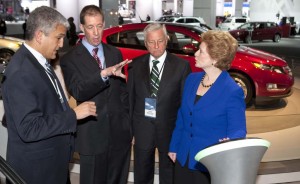Investors aren’t the only ones pleased by the apparent improvements made by General Motors. Less than two months after the carmaker’s record IPO was completed, U.S. “car czar” Ron Bloom could be found touring the GM exhibit at the Detroit Auto Show, where he declared the efforts to revive the maker – and cross-town rival Chrysler – “ahead of plans.”
What’s all the more surprising, said Bloom, the Obama Administration’s top manufacturing adviser, is that the two domestic makers are doing so well in a still-depressed economy, with the auto market itself only barely showing signs of a true turnaround.
“If there’s a positive surprise, I think it’s in the companies’ ability to execute their plans in this environment,” said Bloom.
 That echoes comments made by GM CEO Dan Akerson, yesterday, during and after a speech to the Automotive News World Congress. The former telecomm executive noted that prior to its bankruptcy-led reorganization, GM could barely make money even in the best years the U.S. auto industry ever experienced. It is now positioned to make money in some of the worst markets ever – as it did in 2010.
That echoes comments made by GM CEO Dan Akerson, yesterday, during and after a speech to the Automotive News World Congress. The former telecomm executive noted that prior to its bankruptcy-led reorganization, GM could barely make money even in the best years the U.S. auto industry ever experienced. It is now positioned to make money in some of the worst markets ever – as it did in 2010.
Nonetheless, Bloom cautioned “There is still a long way to go.” And that is particular apparent in the number of jobs that have been lost in the auto industry since the economy turned sour – especially in the Midwest. Overall, the industry has lost about 400,000 jobs, and though Detroit makers have begun adding positions – about 75,000 since the car market bottomed out – that’s a long way from a full recovery.
Bloom was particularly vigorous in defending the oft-criticized bailout of the two Detroit makers – a move that has led critics to frequently refer to GM as “Government Motors.” As bad as the loss of 400,000 jobs might be, President Barack Obama had warned that simply permitting GM and Chrysler to fail completely would have cost another 1 million.
Referring to the bailout and subsequent GM IPO, the car czar said, “In the end, I think we accomplished our objectives. We were able to have our stake in GM, selling significantly more shares than we originally thought possible. Subsequent trading has shown that we fetched a fair price and that we are well positioned to continue our exit on an orderly basis.”
Indeed, Bloom stressed that the White House is planning to continue selling off its remaining shares of GM – and to get rid of its holdings in Chrysler – “As soon as is practicable.” But he quickly stressed that “We’re not going to do a fire sale,” and sell off those remaining shares at an undeserved discount.
The amount the Treasury will lose on the auto bailout is still unclear, though government analysts have repeatedly lowered the estimated figure – especially after GM was able to boost the planned strike price of the IP from $26 to $29 a share to the final figure of $33. The stock has been nudging toward $39 since November and many analysts are predicting it will soon climb as high as $50. At that figure, it is projected taxpayers might actually break even.
As for Chrysler, CEO Sergio Marchionne clearly stated his desire to hold his own IPO during the second half of 2011. The executive, who also runs Chrysler’s Italian partner, Fiat, said the GM IPO was a “snowplow” that helped improve the prospects for the other U.S. automaker’s planned initial public offering.
Before then, Marchionne noted, he may take steps to increase Fiat’s stake in Chrysler to 51%, exercising a variety of options in its deal with the government.
“If that is what comes to pass, I think this is a good day,” responded Bloom, especially if it means more production and more jobs. But he stressed that before Fiat hits that 51% target, “We have a very clear understanding that they (must) pay back the United States government for the loans that are currently on Chrysler’s books.”
Marchionne earlier said that he is exploring ways to pay that money back, and that this will likely require Chrysler to find somewhere else to borrow at least some of the money the government expects. At the moment, that is just over $7 billion, but Chrysler is moving ahead on plans that would reduce its debt to around $5 billion, according to the CEO.

